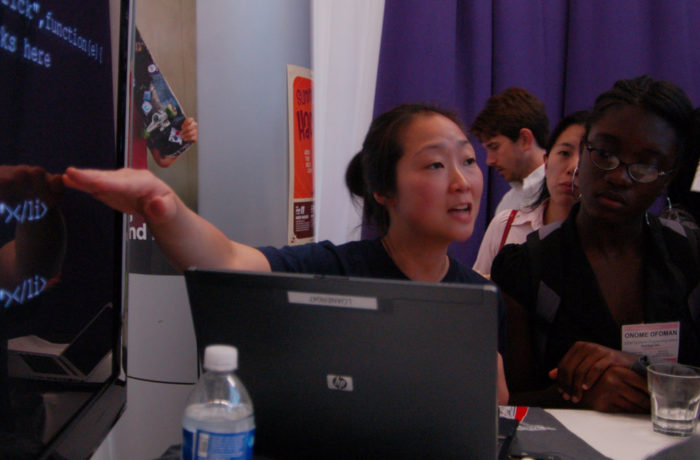In a 2004 speech to the Enterprising Britain Conference, Bill Gates told the audience, “Fear is a great teacher.”
But when you are just embarking on or in the thick of a job search, succumbing to the “what-ifs” or a lack of self-confidence can be more paralyzing than productive. Consider this statistic: according to a Hewlett Packard report, women typically apply for a job only if they feel they meet all of the job descriptions outlined, but men apply for a job even when they feel they are only 60% qualified.
Echoing Gates, “failure needs to be shifted to a growth/learning mindset,” says Gail Berger, Ph.D., Assistant Professor of Instruction, Northwestern University, Industrial Engineering and Management Sciences, Kellogg School of Management. “I encourage people to think about the process, not the outcome.”
The lesson here? A simple change in thinking could go a long way in finding success in the job hunt.
We asked our career coaches to tackle three common situations in which fear can throw a job seeker off course. Here is their advice.
- I can’t identify what I want to do and feel stuck. How can I get the ball rolling? What kind of self-examination should I be doing?
“In thinking about what you want to do, it is helpful to think about your values, strengths and enjoyment,” says Berger. “What kinds of activities bring you joy? At the end of a day, what things did you do that made you feel happy and fulfilled, and what things did you do that were unengaging and uninspiring?”
“Identification of values is important because it can help a person think about what they need from work,” she continues. “Do you, for example, value helping others? Then looking for a job where you are contributing to others’ growth will help you fill a need. Finally, what strengths can you leverage in any job? Are you, for example, a strong collaborator? Do you have a strong attention to detail?”
- I’m having trouble with my resume. Are there any ABCs of resume writing you can impart to help get me started?
The amount of time a recruiter takes to review your resume? Eight to 10 seconds, says Barri Waltcher, a certified professional resume writer, and the co-founder of Mind Your Own Business Moms, a business which supports women in all facets of professional development. That means you have scant time to make an impression. Here’s how to do it:
- Start Strong. Make the time employers spend on your resume count by leading with a Professional Summary.
- Emphasize Results, Not Responsibilities. Most activities (“raised funds”) can be reframed as achievements (“raised $200k, exceeding fundraising goals by 25%”).
- Demonstrate Job Readiness: Address this hiring concern by: incorporating current keywords from your field; listing recent continuing education and certifications; and demonstrating office software literacy.
- Customize. Amend your bullet points and Professional Summary for each job’s qualifications.
- Select a User-Friendly Format. Use formatting to direct hirers to the information they look for first: job titles, companies, start/end dates, and education.
- Include Volunteer Experience. Twenty percent of hiring managers consider volunteer experience in their decision-making.
What should you avoid? Skimping on proofreading, using an unprofessional email address and neglecting your social media platforms. “Dates and jobs on your resume and LinkedIn profile should sync,” she says. “Check your privacy settings, and ensure that your online presence is consistent and professional.”
- I’m afraid to network, but I know I need to do it. How can I gain confidence when it comes to selling myself?
If you are attending a coffee meeting or participating in an informal interview, research the background of the person you are meeting with, says Lynn Weitzman, career coach and organizational development specialist. “If you can find common interests or something similar in your backgrounds it will feel less forced,” she says. If you are going to a networking event, “make small goals so you can feel more accomplished and yet not too overwhelmed, such as speaking with three people.”
What’s more, “be clear about your elevator pitch,” says Mayra Sacco, executive and mindfulness coach focused on career growth and transitions. “You need to have a sixty-second commercial about who you are, what you’ve done (here be more specific about what skills you bring to the table), and what you’re looking for.”
Then, ask questions. “Networking is not a one-way opportunity to verbally deliver your resume,” says Melissa Madura-Altmann, career coach and communications industry expert. “It’s a chance to meet interesting people, listen, connect and grow.”
Finally, keep the connection going, by finding opportunities to reciprocate. “It often feels like we’re asking for favors,” says Weitzman. “But if you can think about how you can help someone out, i.e., send an article of interest to them, introduce them to someone that might help them, send them a congratulatory letter when they have professional success,” you will likely build an enduring relationship.
We know the job search process can be overwhelming. Some find the services of a career coach can help with direction and act as a sounding board. Visit our career coach page for a selection of coaches ready to help take you to the next level.
Additional Resources:
+ Join us for one of our interactive webinar workshops (see (see full calendar of topics here) hosted by our team of career coaches: Boosting Confidence, Creating a New Vision, Turning Passion into Profession, Re-entering the Workforce on Your Terms, Career Change to Work You Love and more.
+ Get the most out of Après with an Après+ membership and gain access to webinars and job board for one year. Save 20% using code WEBINARS.
Après is your savvy friend who sends you a weekly email to help you navigate the exciting, challenging and momentous journey that is Career + Motherhood.





